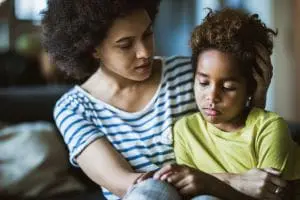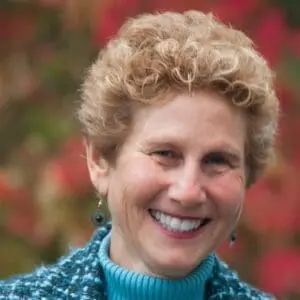Q: I’m seeing more children in my practice who’ve experienced traumatic loss, such as a family death caused by COVID. How can I best help them?
A: Kate Atwood, the founder of Kate’s Club, an organization devoted to helping children cope with grief, says grief isn’t the enemy: unresolved grief is. As a therapist who works with children struggling with grief, as well as a regular volunteer at Kate’s Club, I’ve seen firsthand how family and child therapists can make a positive impact with grieving children and their families. Kate’s Club provides a safe space for children to talk about their grief when a parent or sibling dies; it also provides a physical place for them to connect with other children working through loss. Even if there isn’t a peer-support organization like this in your area, you can do certain things to help kids process their grief and feel heard.
Children grieve differently from adults. How they process it is impacted by the nature of the death, as well as by their age, developmental stage, life experiences, and how the adults around them model coping with grief. Children also move in and out of grief—called grief spurts—and need to handle their grief in small doses. It’s not unusual for young children to express sadness about losing a parent and then minutes later go out to play with friends.
Of course, talking with children about death isn’t easy; it can be uncomfortable for even the most capable therapist. While children four and under generally can’t understand the complexity of traumatic grief, they do sense something has happened and need a caring adult who can comfort them. As they grow older and can understand more, trusted adults will need to tell them the truth, in age-appropriate ways, about how their loved one died. But avoiding talking about grief can create unresolved grief, which I call hidden grief. It stays buried and resurfaces, sometimes years later, and is the type that most often brings children into our offices.
Author Hope Edelman describes this as aftergrief, of which there are three types. Most of us can easily recognize her concept of new grief—grief that occurs right after a death. Then there’s old grief, which can reappear years later as children mature and are more able to process and understand the loss. New old grief is when a new grief triggers an old, unprocessed grief. Old grief and new old grief can be especially hard to discern, difficult to treat, and especially challenging for grieving children to overcome.
Working with Old Grief
Ten-year-old Daniel was refusing to do his homework and picking fights with his friends—unprecedented behavior, his mother told me over the phone before our first session. Bewildered, she decided to schedule an appointment for him. When I took a family history, I learned that Daniel’s father had passed away after a long battle with cancer, when Daniel had been six. In the last month of his father’s life, Daniel’s mother had sent him to stay with his aunt and uncle. She was sad to do so, but too exhausted and distraught to look after him. Plus, she told me, she’d been trying to protect Daniel, as she felt he was too young to understand what was happening.
Daniel’s mother had told him his father had died, but hadn’t let him attend the funeral. Hearing this, I suspected that acting out was his way of expressing old grief. Grief that isn’t acknowledged and left unexpressed can masquerade as depression or anxiety, manifesting in behavioral problems at school or at home. When I asked if I could have a session with Daniel alone to explore this, his mother agreed.
“How’s school going?” I asked Daniel when we were both comfortable in my office.
“Okay,” he responded, in the usual way 10-year-olds do.
“Your mother told me you’ve always been a good student and have lots of friends, but recently you haven’t wanted to do your homework and have been getting into fights. Can you help me understand why this is happening?”
There was silence. After a few minutes, Daniel told me he was feeling sad about not having his father with him for Christmas. He relayed how his father used to take him to a farm every year to cut down their Christmas tree.
I understood that Daniel was more aware of his old grief now that he was 10, and needed the opportunity to share his feelings and tell his grief story. “I imagine it’s hard to talk about your father’s death,” I said, and asked if he remembered how he felt when his father died.
He replied that he’d felt scared, sad, and lonely. He also told me he felt angry about not being able to go to the funeral, and that he thought his father would’ve been upset with him for not going. When I asked him to tell me more, it became clear that he’d been holding this guilt and sadness all these years.
“I bet your dad would’ve understood, because he loved you so much,” I said.
Daniel wiped away his tears and nodded.
Before our next session, I met with Daniel’s mother so I could share what I’d learned. I explained how old grief can come back when children are able to understand more, and encouraged her to share with Daniel why she hadn’t let him attend the funeral. She agreed to a session with him so the three of us could talk.
I’ll always remember that session. Not only did Daniel’s mom share why she hadn’t let him come to the funeral, but, most importantly, she told him she didn’t mean to hurt him and how much she loved him. They cried and hugged, bonding in their grief together.
In our last session, the three of us came up with ways Daniel and his mother could feel more connected to his dad’s memory—what we in Kate’s Club call maintaining continuing bonds. They decided that each year on Daniel’s dad’s birthday, they’d make the special foods he’d loved. And around Christmas, they’d go to his gravesite, and then to a Christmas-tree farm to pick out a tree that Daniel felt his dad would’ve admired.
Working with New Old Grief
New old grief can make therapy feel like detective work. Thirteen-year-old Allison was referred to me because her grandmother had recently died from COVID. In my initial intake on the phone with Allison’s mother, I learned that Allison had been very close to her grandmother but had shown little emotion after she’d died. I also found out that Allison’s father had died when she was seven. She said Allison had barely talked about her dad’s death.
When I met with her and asked about how she felt about her grandmother’s death, she said she didn’t want to talk about it. But after some silence, she said her grandmother’s death reminded her of her father’s death. She remembered her grandmother telling her not to “cause any trouble” for her mother, and that she “needed to be a big girl.” She’d never told her mother about this conversation.
I told her I was sad that she’d had to keep those memories hidden for so long, and asked if she wanted to share some special memories of her father. After telling me a bit about his favorite TV shows, his funny stories about his childhood, and how he used to take her to the grocery store so they could pick out special treats together, I suggested that she could make a collage of some of her favorite pictures of him as a nice way to remember him. She loved the idea, and said she’d hang it up in her room.
When I met with Allison’s mom, I mentioned that children hide their grief for many reasons and that new grief can trigger old grief. I believed this was the situation with Allison, I told her, and she agreed that the three of us should do a session together so Allison could share her feelings.
In this session, I encouraged Allison to share what her grandmother had told her after her father’s death. At first, she was hesitant, but being able to share the grief she’d been hiding was powerful for both of them. Allison’s mom emphasized that, despite her grandmother’s well-meaning message, it’s okay to cry and be sad after someone you love has died. For the first time, Allison cried with her mother about her father’s death, which led her to tell her mother that she really missed her grandmother. I suggested we have another session so they could express more feelings with one another.
In this last session, they laughed and cried together, which created a reparative experience for Allison. How adults model their own grief can greatly influence how children cope. If parents hide grief from their children, then children may think it’s not okay to grieve. Or children may hide their grief because they don’t want to upset the adults around them, as Allison had done. It’s also possible that parents may be so bereaved that they don’t notice their child’s grief, and then the child can come to believe that their grief is invisible and unimportant.
Making the Space Safe
As is often the case with therapy, there isn’t a one-size-fits-all approach. Grief is multifaceted and complicated. In my experience, you don’t have to be a grief expert to do this work, but you do need to get comfortable talking about death and grief with children. Family therapy is a great format for providing children with a safe space to express their grief. But they often need a variety of ways to work through it. Fortunately, other modalities, such as play therapy, storytelling, art, and music therapy, are good formats for children to do so.
Because children may not be able to understand certain aspects of death, you may need to be creative in how you explain things without hiding the truth of them. Let’s say, for example, that you’re working with a young boy whose father has died of a heart attack. To articulate what a heart attack is in a way the child can understand, you might say something like, “Your father’s heart wasn’t well. He had something called a heart attack, and his body stopped working.” You might then assure him that his father isn’t lonely, hungry, in pain, or scared. Knowing that children need reassurance, you might remind him that while his father’s heart stopped beating, his heart is healthy, and you might ask him to place his hand on his heart and feel it beating.
The years I’ve spent doing this work at Kate’s Club have been transformative. It’s opened my eyes to a new way of doing therapy, and a new way of giving back. There’s a kind of magic that happens when a child can finally share their long-held grief, an opening of the heart that’s amazing to witness. In a world that sometimes feels as if it’s grieving more and more each day, giving kids the space to heal is tremendously important.
Want to submit a Family Matters piece for an upcoming issue? Please see the Submission Guidelines on our website.
PHOTO © ISTOCK/SKYNESHER
Nancy Kriseman
Nancy Kriseman, LCSW, has more than 30 years of experience offering Counseling, Consulting and Training for Elders, Families & Professionals.













